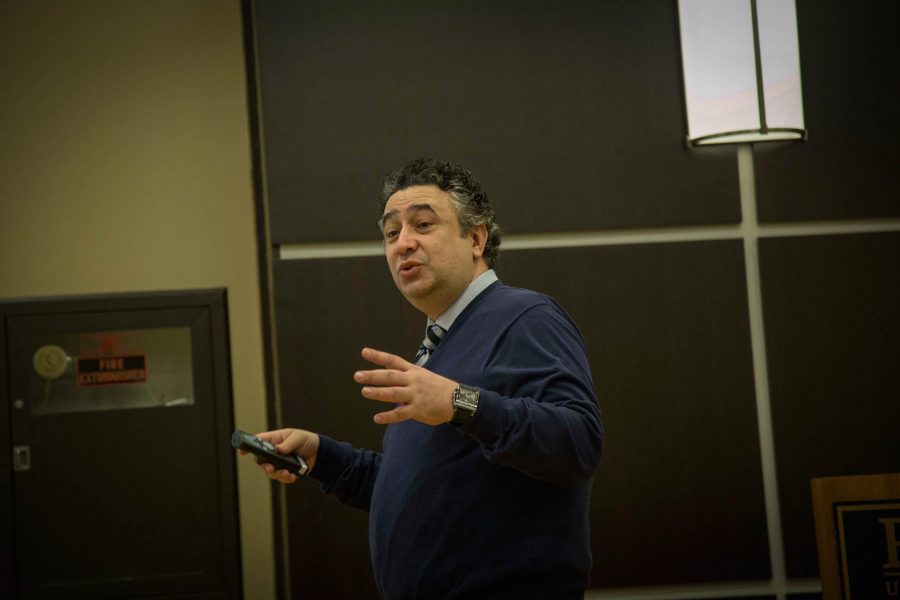Speaker urges listeners to sympathize for refugees
Shadi Martini, senior Syria adviser for the Multifaith Alliance for Syrian Refugees and a native of Syria, speaks at PNW.
During his presentation, “The Realities Behind the Syrian Refugee Crisis,” in Alumni Hall on Feb. 16, Shadi Martini, senior Syria adviser for the Multifaith Alliance for Syrian Refugees and a native of Syria, urged listeners to do what they can to make the United States more welcoming to Syrian refugees.
Martini said the U.S. had only accepted 15,772 refugees prior to the indefinite ban placed on Syrian refugees by President Donald Trump. In comparison, Martini said 4.8 million refugees have left Syria, and most of them live in Jordan, Lebanon and Turkey. Many refugees live in cities consisting of tents stretching for miles, and many more live in urban areas. They mostly receive aid from non-governmental organizations.
According to Martini, the aid is underfunded, and although the flight of refugees has slowed, another 13.5 million people in Syria need help.
“It’s not because there are no more refugees trying to get out. It’s because everyone has sealed its borders,” Martini said. “Be armed by facts and not emotions.”
Richard Rupp, associate professor of political science and director of the Center for Global Studies, said he has spoken about the humanitarian crisis in Syria since its civil war began in 2011. He said the crisis is no longer just a civil war, since foreign powers are taking sides. People should also look at the impact on the personal level. More than 500,000 people have died. To see the personal level, it is important to listen to perspectives like Martini’s, Rupp said.
Martini was managing director of a Syrian hospital when the crisis began. In 2011, some children placed anti-government graffiti on a wall and were arrested. When community elders asked for their release, the government said no. Demonstrations began and four people were killed, Martini said.
“The crackdown became more brutal and more brutal,” Martini said.
In what Martini explained as a situation that had a profound effect on him, a 4-year-old boy who had been shot came to his hospital. Since the government asks questions of people who come to the hospital, the boy said he was shot by terrorists.
After the government agents left, the boy told Martini that he was shot by terrorists on a tank. Only the government had tanks at that time, and Martini said he realized the boy had been commanded by his parents to use this story to protect himself.
Because hospitals have to inform the government about all their patients, Martini and other medical workers realized they needed to form a network to treat patients outside hospitals. They did this for more than a year before some were arrested and others had to flee, he said. He fled Syria in 2012.
Although Trump is now calling for “extreme vetting” of refugees, Martini described the system put in place by President Barack Obama as extreme vetting. This system is much stricter than the vetting in Europe, so Martini said the level of risk should not even be compared to the risks of the European system.
In the U.S. system, Syrians registered as refugees must be interviewed. The children will be questioned separately from their parents. Refugees will be denied entry if they give any answer the officials dislike.
Responding to the claim of the costs being too high to resettle refugees, Martini said the most significant cost is the airline ticket, which the refugee must pay back.
“They will tell you, ‘We don’t want handouts. We want work,’” he said. “If someone wants to live on benefits, he won’t come to the United States.”
Among other arguments for accepting refugees, Martini said the refugees who come to the U.S. tend to be highly educated and contribute to the economy after six months. Many open businesses and thousands of Syrian physicians live here, he said.
Martini showed a picture of the camps and said leaving children to grow up there will lead them to despair.
“We create the perfect situation for these kids to go to these radicals,” he said.




